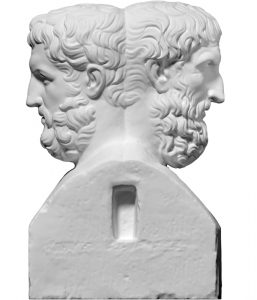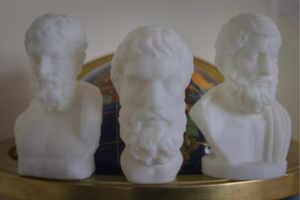Eikas cheers to everyone! An Eikas program given many moons ago on Epicurus’ Sermon On Moral Development is live on our YouTube channel. Please enjoy, comment, and share. Also, I wish to thank Anthony, Caleb, Thomas, Tom, Ron, Steve & Carmel for their continued Patreon support, which encourages me to keep creating content.
Simon Knutsson has published A defense of ataraxia: Undisturbedness as the hedonic ceiling. George Washington University published Are the modern Stoics really Epicurean?
The following essay is dedicated to the memory of Mahsa Amini, and is written in solidarity with the Iranian people, and in particular with Iranian women’s struggle for secular values and for the attainment of non-religious law and order.
I fear perhaps thou deemest that we fare
An impious road to realms of thought profane;
But ’tis that same religion oftener far
Hath bred the foul impieties of men:
As once at Aulis, the elected chiefs,
Foremost of heroes, Danaan counsellors,
Defiled Diana’s altar, virgin queen,
With Agamemnon’s daughter, foully slain.
She felt the chaplet round her maiden locks
And fillets, fluttering down on either cheek,
And at the altar marked her grieving sire,
The priests beside him who concealed the knife,
And all the folk in tears at sight of her.
With a dumb terror and a sinking knee
She dropped; nor might avail her now that first
‘Twas she who gave the king a father’s name.
They raised her up, they bore the trembling girl
On to the altar- hither led not now
With solemn rites and hymeneal choir,
But sinless woman, sinfully foredone,
A parent felled her on her bridal day,
Making his child a sacrificial beast
To give the ships auspicious winds for Troy:
Such are the crimes to which Religion leads.
Lucretius, De rerum natura, 1.80-101
The human sacrifice of an innocent girl by her father to the Goddess Diana is cited by Lucretius, from the onset of his poem, as an example of why we need philosophy. To those of us who grew up under the yolk of Abrahamic religiosity, the sacrifice of Jephthah’s daughter in Judges 11 is a Biblical equivalent. But murderous religion is still a problem today: hildren are killed or burnt after being accused of witchcraft by Christian animists in Africa, and the Iranian regime is known for killing young girls and protestors. One could even argue that a comparable compulsion to offer youth and vitality in the altar of reactionary, conservative religious and political ideology is the Russian Orthodox patriarch’s promise to wipe out the debt of all sins for young men who fight in Putin’s “holy” war.
Lucretius mentions Iphianassa in the opening portions of his poem, shortly after praying to Venus for “peace in the land”, as a way to justify his call for a non-superstitious social contract, one that is not tainted by the terrors of religion. Similarly, a Kurdish woman that was murdered by the Islamic regime is being used by Iranians as a symbol of their resistance, and her death seems to have marked the beginning of the end for the Islamic Republic of Iran.
A Kurdish Iphianassa
Mahsa Amini–an innocent 22-year old woman who was beat and executed by the “morality police” in Iran back in September for not covering her hair properly–has by now become an icon of the ongoing Iranian revolution, which registers the post-Muslim secularism that exists among the youth. Due to the totalitarian nature of the current regime and its disinformation campaigns, it’s impossible to know with certainty how many people still identify as Muslim in today’s Iran, but according to this source, less than a third of all Iranians consider themselves adherents to the official Shia doctrine of the state, while
22.2% identified as non-religious; 8.8% identified themselves as atheist; 7.1% as spiritual and 7.7% as Zoroastrian
A new generation ripens, surrounded by dangers, but made fierce by its struggles. Their slogan is “Jin Jiyan Azadi” (Woman, Life, Freedom). It represents a life-affirming doctrine by which people hope to rid themselves of the current official ideology. This new doctrine is born from the Kurdish independence movement and from the recent struggles against ISIS.
In adopting this slogan, part of what the nationalists are saying is that it’s not worth fighting for independence if they’re going to fall into Islamic totalitarianism, like their neighboring countries. After fighting the Islamic State, they know that a land of endless religious oppression would not be worth fighting and dying for. This is why they feel the need to articulate a new, secular, democratic social contract that includes women’s rights that are unacceptable for ultra-conservative Muslims.
Ocalan and the New Kurdish Social Contract
One of the masterminds of the “Woman. Life. Liberty.” slogan is (Kurdish-Turkish political prisoner) Abdullah Ocalan–an anti-capitalist, anti-patriarchal proponent of federal democracy and of a local brand of feminism known as jineology–which translates into women’s wisdom, or women’s science.
The female gender is a central theme in both Ocalan and in Lucretius. By placing women at the heart of the revolution and of the social contract, Ocalan made a similar plea as Lucretius in The Opening of DRN: they wanted a type of new peace in the land that made freedom for women (from religious oppression) non-negotiable. Both call for a social contract that is rid of religious errors and terrors.
We may or may not agree with Ocalan’s anti-capitalism, but there is a certain tactical validity to this ism. The people of Kurdistan have already voted for independence from Iraq, and are in the process of building a nation. This requires healthy cooperative and grassroots networks. They need values that unify them, and the ability to form federations is essential to help them overcome tribalism. In a way, Ocalan and his partisans are successfully creating a similar intertribal peace to the one that Muhammad had achieved in Medina, but in the name of a secular worldview adjusted to his particular historical and social reality. Conservative politics in the Middle East are almost always informed by religious fascism, so a unifying secular ideology must almost inevitably originate on the left.
As if echoing Lucretius’ argument that only Venus is able to tame the belligerent “Mars” energies in the land, Ocalan says that only FREE and educated women can tame the belligerent energies that threaten Kurdistan (from ISIS, as well as from Islam, Syria and Turkey). Let us remember how valiantly Kurdish women fought ISIS when demented men of God from all over the world gathered in Syria to enslave and rape women and girls, and to massacre anyone who was not aligned with their radical, violent form of Islamist ideology.
Women. Life. Freedom. is a call to arms against theocracy in the Middle East, and a useful case-study that helps us to place before the eyes many thought-provoking aspects of the Epicurean doctrines concerning natural justice and the social contract. By placing liberty and women at the forefront as non-negotiable, the resistance posits a new social contract that cannot be reconciled with the Islamist theocratic one or with shari’a law. They are both mutually exclusive to each other.
With the clear intention of unifying people in order to reverse the spread of Islamist theocracy in the region after ISIS, Ocalan created a new grassroots feminism in the heart of the Middle East: an indigenous, secular doctrine of Liberty, one that calls for a new social contract that does not impose Islam, or religion, on people. This the first modern, native, Middle Eastern humanist philosophical, cultural, and social movement that wishes unequivocally to eradicate Islamic theocracy and enshrine liberty on its constitution and way of life, as far as I know, without blindly copying Western models of secular values. This indigenousness is important in a region where such great distrust of foreign ideologies prevails, and also in light of the fact that most pundits believe that Kurdistan will most likely become a new independent country in the coming decades.
The slogan of the French Republic (“Liberté, Egalité, Fraternité”), and some of the foundational slogans of the American Republic (“Life, Liberty and Pursuit of Happiness”) are still fashionable statements of the values of our countries. Will the slogan of the new Republic of Kurdistan and of the hoped-for future secular, democratic Republic of Iran last 200+ years in a region surrounded by religious authoritarianism?
Women Warriors and the Channeling of Martial Energy
Natural justice is an expression of utility, to prevent one person from harming or being harmed by another. – Principal Doctrine 31
Not everyone will be harmless to the women and men of Iran and Kurdistan if they adopt a secular constitution. Principal Doctrine 39 reminds us that there will always be people who fit within our social contract, and others who do not. This is why virtually all societies tend to enforce conformity to their social contract, and must defend it from hostile forces. Hence, the women warriors of Kurdistan.
Notice that the Opening of DRN does not call for the censorship or the emasculation of Mars, of manhood, or of aggression; rather, it advises a pleasant outlet for Mars’ aggression, even as it recognizes its dangers. Aggression, when channeled correctly, is made pleasant or made to serve a pleasant existence. We can think of certain physical exercises, sports, or sex as healthy outlets for aggression.
In Iranian and Kurdish societies, we see that aggression is being used in self-defense by the defenders of secular values. Let us remember that this is the generation that had to fight ISIS and see with its own eyes the terrors of religion, and of tribalism. Woman, Life, Freedom is the ripened fruit of moral development gained in Kurdistan from having to confront the reality of what the Islamic state was and did. Kurds’ sense of peoplehood helped them to repel ISIS. As a result, public disgust at the Islamic State became part of the collective psyche and memory of Kurds, and rectifying the crucifixions, beheadings, human trafficking and rape of the Islamic State is a matter of self-respect and dignity for Kurds.
ISIS showed them the urgency to diminish the forces of Mars / belligerence in the land mentioned in the Opening of De Rerum natura. This, and Ocalan’s insistence that women must be in leadership positions in their new social contract, also reminds us of the Venus over Mars theme.
Another way to interpret or consider the Venus-Jinology connection is based on the fact that religious social contracts tend to be anti-woman. Perhaps we can also consider it in terms of how a “matriarchal” instinct may emerge in some societies as a refuge from or a counter-balance to violent patriarchal excesses.
Finally, let us concede here that what Lucretius depicts in poetic, archetypal form, expresses itself in history as a revolution brewing before our eyes which requires many sacrifices. It’s not a theory or contemplation, but a brutal struggle. Our comparison of women’s struggle with Lucretian philosophy, while insightful, cannot do it full justice.
The Burning of the Hijab
The Mahsa Amini protests were inaugurated with ecstatic images of women dancing around bonfires, some of them like Sufi swirling dervishes, and burning their hijabs.
The Zoroastrian connection here is very easy to miss by most Westerners. Zoroaster was a laughing philosopher, and dancing is forbidden in the Islamic Republic of Iran. Although the right to happiness has not made it into their slogans, it is clear that this is part of what Iranian women and youth are yearning for.
Fire is sacred to Zoroastrians and ancient Iranians. It’s a symbol of the Zoroastrian God, and the main ceremonial technology tied to Zoroastrianism. Furthermore, Zoroastrians have suffered near-genocide and are on the verge of extinction in the land of their birth as a result of the centuries of violent Islamization of Iran.
Therefore, when dancing women burn the hijab–a symbol of Islamic oppression–at the altar of their ancestral, pre-Islamic God, this is not just a protest. This is a ritual. They are returning to their pre-Islamic spiritual and philosophical roots, and conjuring ancestral powers and ideas to come to their aid at this junction in history.
In Solidarity
If Iran is ever able to overcome Islamic theocratic totalitarianism and become a secular democracy, this will greatly increase my optimism about humanity. Even more so if Kurdistan becomes a new, sovereign, democratic state. This would mean that there would be two new non-theocratic countries with kindred humanist values at the heart of the Middle East, spreading and defending secular ideas. I hope they succeed, and win for themselves a life that is free and happy.



